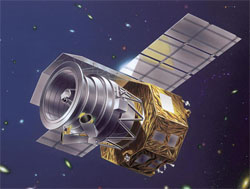Japan Launches New Observatory for Infrared Sky Survey

A new space-basedobservatory is circling the Earth after a successful launch from Japan'sUchinoura Space Center.
The ASTRO-F infraredobservatory rocketed into space atop an M-5 booster that launched on time atabout 4:28 p.m. EST (2128 GMT), the Japan Aerospace Exploration Agency (JAXA)reported.
The launch marked JAXA'ssecond attempt to launch ASTRO-F this week after poor weather prevented aMonday space shot. It is also the second successful space shot for Japan infour days following the Feb. 18 launchof the Multi-functional Transport Satellite-2 (MTSAT-2) atop an H-2A rocket.
"ASTRO-F is flying quitewell," JAXA officials said in a launch update, adding that the observatorysuccessfully popped free from its booster's upper stage.
Previously known as theInfraRed Imaging Surveyor (IRIS), the ASTRO-F observatory is a space-basedinfrared telescope designed to conduct a comprehensive survey of the sky from asynchronous polar orbit. The mission is a joint effort of JAXA and researchersfrom Korea and the European Space Agency (ESA), JAXA officials said.
The 2,098-pound (952-kilogram) ASTRO-Fobservatory is the first dedicated infrared instrument for JAXA's Institute of Space and AstronauticalScience (ISAS).Today's launch comes after a design flaw revealedin December 2003 delayed ASTRO-F from a 2004 liftoff.
The observatory is designedto circle the Earth every 100 minutes in a polar orbit with an altitude ofabout 462 miles (745 kilometers), according to its flight plan.
Breaking space news, the latest updates on rocket launches, skywatching events and more!

Tariq is the award-winning Editor-in-Chief of Space.com and joined the team in 2001. He covers human spaceflight, as well as skywatching and entertainment. He became Space.com's Editor-in-Chief in 2019. Before joining Space.com, Tariq was a staff reporter for The Los Angeles Times covering education and city beats in La Habra, Fullerton and Huntington Beach. He's a recipient of the 2022 Harry Kolcum Award for excellence in space reporting and the 2025 Space Pioneer Award from the National Space Society. He is an Eagle Scout and Space Camp alum with journalism degrees from the USC and NYU. You can find Tariq at Space.com and as the co-host to the This Week In Space podcast on the TWiT network. To see his latest project, you can follow Tariq on Twitter @tariqjmalik.
